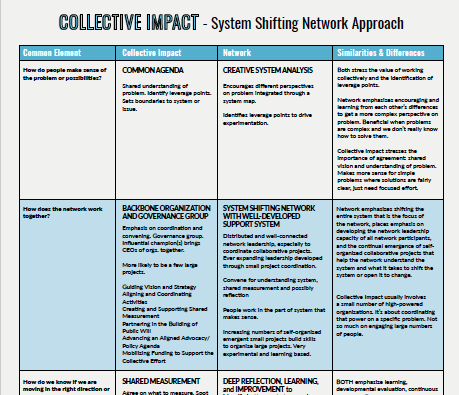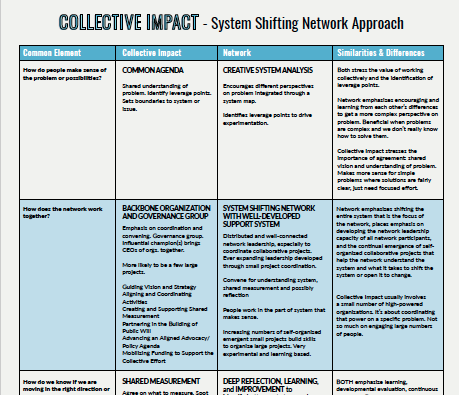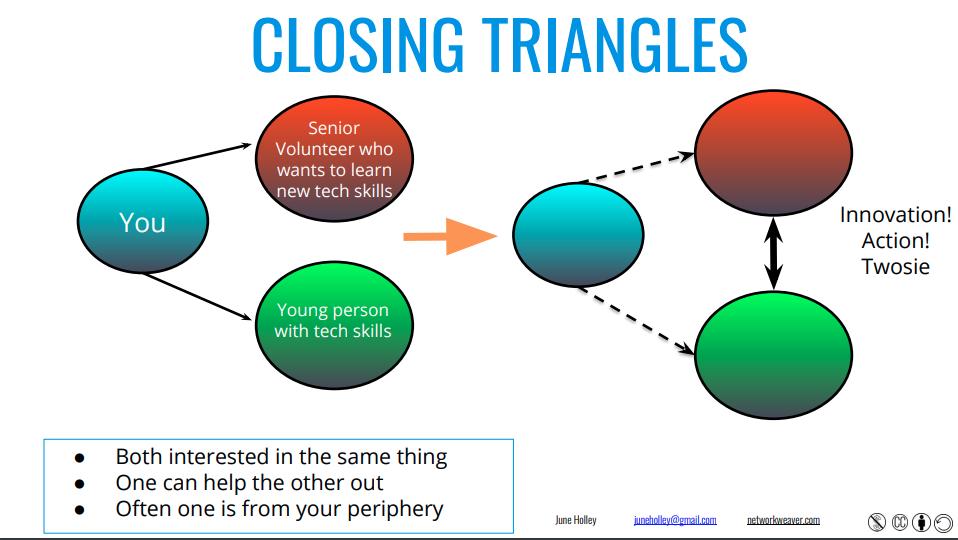Collective Impact
People frequently ask “How do network approaches differ from Collective Impact? Actually, Collective Impact, with a few modifications, can be a system shifting network approach which can increase its long term impact by engaging many more people in change work.
If you are a Collective Impact initiative, you might want to share this chart with your partners and spend time deciding which network qualities you might easily incorporate into your efforts.
Collective Impact ~ System Shifting Network Approach
People frequently ask “How do network approaches differ from Collective Impact? Actually, Collective Impact, with a few modifications, can be a system shifting network approach which can increase its long term impact by engaging many more people in change work. Adding a more networked approach can also enable the Collective Impact effort to tackle more complex problems.
We have developed a chart that details each approach and then delineates the differences.
Collective Impact initiatives are quite different as a group and your Collective Impact initiative may not fit my rather simplistic description. Please let us know how your initiative works and whether it includes any network approaches.
If you are a Collective Impact initiative, you might want to share this chart with your partners and spend time deciding which network qualities you might easily incorporate into your efforts.
To summarize the chart:
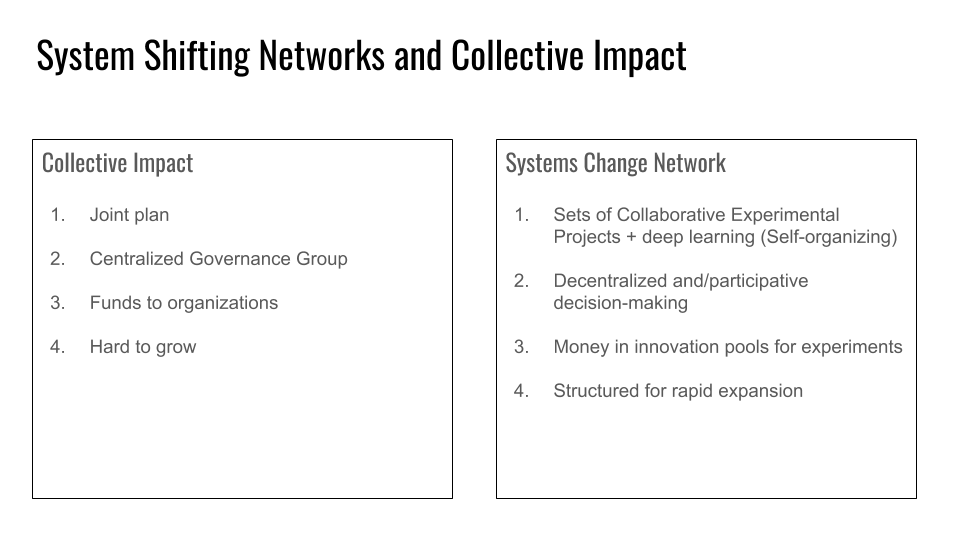
We encourage you to comment on this post so we can hear about your thoughts and experience.
[ap_spacing spacing_height="15px"]
Money Patterns Matter
February 14, 2019Education,Blog,Transformation
Join us for an interactive workshop with Michael Linton about circular systems for circular economies. There is more talk of the circular economy than there is action, and will be until circular moneys makes material and service circulation possible and viable. But, too few yet have any idea what circular money actually is, and less still know how easy it can be to implement.
This is an opportunity to begin a process of participative enquiry, to discover how to apply common money to open cooperative ventures so that they can pay their own way.
[ap_spacing spacing_height="15px"]
February 21, 2019 18:00 UTC Event time in YOUR time zone HERE
Hosted by Nenad Maljković and Michael Linton
[ap_spacing spacing_height="20px"]
Start NOW: take time in advance of our workshop to check out notes shared by the presenter
Video conference joining instructions will be shared vie email ONE HOUR BEFORE the event. Contributors to REconomy practitioners Open Collective have FREE access to all our events.
This event is organized within REconomy practitioners local-to-global virtual community of practice. Click here for more information about what we are up to.
[ap_spacing spacing_height="20px"]
Stop the Madness: You can't train others on inclusive networks when your diversity is lacking
I love June Holley. June has been committed to my success since day 1. Several years ago, we were both on a site created by MIchael Soto, called Spark Collaboration. June and I were matched and met virtually. From that moment, she used her power as an ally to open doors for collaboration. She became my mentor and a fierce advocate. I am forever grateful.
As I view the leaders of many of the network trainers, I do not see the diversity necessary to bring new ideas and perspectives to the table. By telling others this is important, we must examine our organizations to ensure that we are living the teaching we are leading others to do. According to Pew Research Center, by 2055, our demographics will change drastically. Does our work reflect this fact?
World Population Review
"Growth in the Hispanic and Asian populations is predicted to almost triple over the next 40 years. By 2055, the breakdown is estimated to be 48% White, 24% Hispanic, 14% Asian, and 13% Black. As of 2015, 14% of the United States' population is foreign born, compared to just 5% in 1965. Nearly 39 million immigrants have come to the US since 1965, with most coming from Asia and Latin America. The 2015 Census Report predicts that the percentage of the US population that is foreign born will continue to increase, reaching 19% by 2060. This increase in the foreign-born population will account for a large share of the overall population growth. The average US citizen of 2060 is likely to be older than the average citizen of today, and almost one in four people will be 65 or older. At the same time, the percentage of people who are working age (18-64) is likely to fall from 63% today to 52% in 2060. "
-World Population Review, United States.
These changes will impact the way that we collaborate and work together. As Network Weavers, we must be leaders in this space, modeling the behavior that we are telling others is important as they build relationships in their local communities. There are several questions we must ask:
1. Who are our mentors? What unique perspective to they bring to our work?
2. What is the racial, ethnic, age composition of our teams and those in leadership in our organizations?
3. How are we building our toolkit to unpack our often unknown biases that may contribute to our comfort with sameness?
My research focuses on social capital and diverse women. One of the things I discovered is that in order to build trust, we have to create the space for it. This includes having those courageous conversations to make sure the right people are at the table. We must go beyond bonding social capital---connecting to those who are similar to us and create the space for bridging/linking social capital.--connecting to those who are different than we are. When we do this, the ideas, the points of view will radically change the way we see the world and how we fit in it. We so desperately want this for our communities which is why we are in this work---we must be willing to embody those same principles in the folks that work with us.
One of the most powerful books I've ever read was the work of by Linda Tuhiwai Smith, Decolonizing Methodologies: Research and Indigenous People. This book forced me to realize how what we believe is truth may not necessarily be the truth for others. We all have ways of knowing and making meaning of what we experience. This book challenged me and further explained the role of imperialism on indigenous communities. I would strongly encourage you to read this to broaden your views and challenge your perspective. It affirmed my research when I listened to two women in my research group identify with unemployment differently because of race and affluence. Our experiences, the way we see the world, our perceptions of truth are different and if we are not willing to push ourselves beyond our comfort zones, listen, include and collaborate with others, our work will be less than its full potential to transform the communities we serve and love.
Diversity is important.
[ap_spacing spacing_height="15px"]
Dr. Froswa' Booker-Drew
To find my books:
http://www.austinbrotherspublishing.com/RulesofEngagement.html
http://www.austinbrotherspublishing.com/ReadyRevolution.html
https://www.walmart.com/ip/Rules-of-Engagement-Making-Connections-Last/53408415
https://www.walmart.com/ip/53441848
Links about my work:
https://www.youtube.com/playlist?list=PLodopVuLSnxMAk3n78dYFHulcuuxk0BJm
(Our talk show!!!) https://4good.org/froswa-booker-drew
Purvi Shah
Purvi Shah inspires changes as a consultant on gender, racial, and economic equity. As an anti-violence advocate, trainer, grassroots researcher, and facilitator committed to opening space for transformation, she delights in movement-making, strategic action for change, and furthering equity in community.
While serving as Executive Director of Sakhi for South Asian Women, a community-based anti-violence agency, she witnessed the profound impact of systems on immigrant survivors of violence. The disparity in access to justice for survivors led her to spearhead coalition-building towards local and national systems change on language access in the courts. This effort led to a new court rule on access to interpreters and a State workplan for language access. In 2008, she won the inaugural SONY South Asian Excellence Award for Social Service for her leadership fighting gender violence.
Closing Triangles
February 7, 2019Network Processes,Blog
Today's free resource is a diagram showing how to close triangles that you can print out and share with your network so they learn this basic network weaving skill. One of the simplest - and most powerful - ways to weave a network is by closing triangles.
Often the first step is when someone you know comes to you with a need or interest. Or you meet someone new and ask questions to find out their needs, interests and skills. You then think about people you know who could help this person with their need, have an interest in common, or who could benefit from the skills of this new acquaintance.
For example, you might know a senior who wants to learn new tech skills, such as using zoom or google docs and you also know a college student who wants to practice showing people how to use technology.
The next step is to bring the two people together. It's great if you can be part of the introduction and can set up a time for the two to meet, perhaps at a local coffee shop or community center. During the conversation, you might ask each to share a little about themselves and have each talk about their interest in technology. They will generally move to how they can help each other quite naturally. You might want to help them set up a second time to meet if that is appropriate.
[ap_spacing spacing_height="15px"]
Your goal, however, is for them to continue their relationship without you being in the middle (hence the dotted lines in the diagram). this way you have time to close many more triangles in your networks!
We'd love to hear in the comments any ways that you use the closing triangles diagram
[ap_spacing spacing_height="15px"]
Encouraging Innovation & Collaboration at the Grassroots: GoPhil Seed Grants in Nepal
February 4, 2019Blog,Network Leadership,Transformation
GoPhilanthropic is a US-based non-profit that helps grassroots organizations provide access to education, health and human rights in impoverished regions round the world. Co-Founded in 2011, our belief is that genuine philanthropy goes well beyond simply writing a check — philanthropy involves active engagement, investment and collaboration on all levels. Our vision is to create a network of partnerships around the world fostering a shared responsibility in solving global issues. We value innovation, collaboration and cross learning and support some 40 programs in seven different countries - Kenya, Guatemala, Cambodia, Vietnam, Laos, India and Nepal.
Trafficking, particularly of women and children, is a critical issue in Nepal. Despite the efforts of many government departments, UN agencies, INGOs (International Non-Governmental Organizations) and NGOs, it is a problem that is growing rather than shrinking. Over the past three years working in Nepal, GoPhil has raised concerns over a lack of collaboration, coordination and resulting duplication of efforts between varying organizations working in the arena.
As GoPhil’s Director of Global Programs, I attempted to understand more of the landscape by researching and conducting extensive Skype calls to meet with a wide range of NGOs and networks in Nepal working on trafficking. It led us to realize there are indeed a number of existing efforts to promote collaboration and coordination amongst organizations (particularly within the Nepalese NGO sector) yet there was definitely room for improvement in terms of the effectiveness of their efforts. Many reported that there was “more talk than action” and that any organized networks or trafficking alliances were not known about by their peers and didn’t have sufficient funding to act.
[ap_spacing spacing_height="15px"]
Network Mapping
GoPhilanthropic Foundation has a long history of encouraging organizations to network, share and cross-learn. It’s the third prong in our mission to IDENTIFY, INVEST, and SCALE the work of grassroots efforts providing access to education, health and human rights for marginalized people. In hopes to fuel more of this “scaling” we proposed taking our cross-learning efforts in Nepal in a new direction. Rather than continuing to develop more partnerships with individual organizations, each working on their separate agendas related to trafficking, we decided to develop a pilot program with seed funding that would specifically encourage and promote more effective collaboration amongst the organizations working on this issue. This rather unique notion was set forth by June Holley in her “Network Mapping” work. GoPhil had the honor of being guided by June as we set out to apply her concepts in the human trafficking NGO world in Nepal.
June introduced us to The Leadership Learning Community (LLC), a non-profit organization transforming the way leadership development work is conceived, conducted and evaluated, primarily within the nonprofit sector. They had already run a successful seed grants initiative. They shared that in 2017 they had funded three seed grants—each around $8,000 each (not huge amounts) and explained that their original idea behind this was to create funds with few strings attached so that organizations could learn and experiment. Grant applications were simple and easy to fill out and the time frame for the grant cycles short (8 months). Then they focused on bringing back and sharing the lessons of success and challenges from their collective experiences. This would encourage innovative ideas that are usually not given the space to be tried out. For more information about their process, please visit: http://www.leadershiplearning.org/blog/miriam-persley/2017-04-27/how-leadership-development-programs-can-harvest-social-change-though-
[ap_spacing spacing_height="15px"]
Selecting our Grantees
Once we had developed a Call for Proposals that emphasized all the core criteria (anti-trafficking, innovation, collaboration, maximum grant size $3,000 per project) we circulated this widely amongst our networks. We were very pleased to receive 20 very strong proposals from a wide range of NGOs across the country, both big and small organizations, many of whom we had never met before. Given the high quality of applications received, selecting the successful four projects was a challenge and involved reviews and discussions across the GoPhil team. Grantees were chosen on the basis that the project seemed ‘do-able’ within a budget of $3,000 per grant and could be completed with in the six month time frame (January – July 2018), Most importantly though, they needed to highlight a strong element of innovation within their chosen project and display a genuine desire to learn and collaborate. We selected four projects that were employing very unique strategies to tackle trafficking and were located in different parts of the country.
Using a spider web ice-breaker exercise to demonstrate the power of collaboration.
In July of this year, after the projects had been completed, I had the privilege to travel to Nepal to meet all of the organizations involved in our seed grant initiative and to facilitate the sharing of their unique learnings. It was enormously inspiring to meet all the people who had been working hard to tackle trafficking in their communities and to see them exchange their experiences, successes and challenges with each other. Every organization had approached their project differently, with the seed grant initiatives ranging from capacity building within an existing network of anti-trafficking NGOs to producing a short animation to raise awareness of the risks of volunteering in an orphanage (and the link to trafficking of children to orphanages). Each of them had achieved far more than we even expected in the short six-month window and every one of them planned to continue their efforts. Amazingly the seed grants had kicked off new programs of work and brand new collaborations between organizations working for the same goal.
Video on GoPhil’s seed grants:
For GoPhil, there were many key highlights of this new program:
- Expansion of GoPhil’s network of great NGOs: GoPhil takes vetting of new prospective partners very seriously. Through this seed grant process, we have now met (and vetted) some incredible new organizations, as well as having an opportunity to work formally for the first time with a couple of NGOs we have known for a while. Being able to see how organizations operate, communicate with their donors, report on their work and interact with each other is a wonderful way of identifying potential long-term partners for GoPhil.
- Honest Reporting: We really probed our grantees to share their challenges, as well as what went well.
This is often difficult for implementing organizations to do though, as they are keen to paint a rosy picture for their donors! However, we were thrilled that our message got through and the organizations shared very honest and reflective reports with us—highlighting not just their achievements but also what they would change or do differently next time.
- A rare yet needed form of granting: Throughout the one-day meeting, participants kept remarking how unusual it is to find funding available for these kind of pilot projects. The organizations hugely appreciated the opportunity this grant had given them to learn, experiment and try out new ideas that they had been wanting to explore for a while but lacked funds. Providing this opportunity for them to experiment and learn is very unique and important in helping them to fine tune their programming.
Macchindra from Chapter Nepal talks us through the organizations and networks that he is associated with.
- A genuine desire to help each other: In the meeting, people were very interested in each other’s projects – and we had to allow more time than we had anticipated after each presentation for questions and answers, and also for participants to make suggestions for each other. There was a real sense that everyone wanted to help each other. No one organization can address all the aspects of anti-trafficking work – e.g. protection, prevention, rescue and rehabilitation – so the participants were very pleased to learn about each other’s organizations and what they did because they could identify where they might be able to refer cases to each other in future.
- A new life experience for isolated NGOs: For some of the people attending the meeting from outside Kathmandu, this was the first time they had ever been invited to participate in a national level meeting in the capital.
- Proof is in the pudding—it worked! The power of collaboration was definitely recognized – through working in networks, referring cases to other organizations and working with other organizations in order to have a wider reach. At least two networks will continue as a result of the grants – with the anti-trafficking network in Makwanpur that we supported now revitalised and a new network formed by one of the partners Kumudini in Nuwakot district.
We are keen to stay in touch with all the participants to find out what else emerges from these seed grants over the coming months and years. GoPhil learned a huge amount on the different strategies to tackle trafficking in Nepal through this program and our partnerships. We are very grateful to June Holley and her colleagues for all their support and will continue to follow up with June and other networks doing similar work so we can continue to learn from one another.
This seed grant program was very different to GoPhil’s normal way of working and has given us the motivation to continue to apply new and innovative approaches to complex problems. We are now looking at developing similar seed grant programs on other issues and in other countries – and welcome any further support, including funding, that helps us to expand this exciting program!
Network Weaving FB Group Mapping Invitation
January 31, 2019Network mapping,Blog
Sarah Shanahan and Jim Best of the Master Mappers are hosting an Exploratory Meeting about social system mapping of the Network Weaving Facebook Group.
WHERE: Please register in advance for the Exploratory virtual conversation (hosted on Zoom).
WHEN: February
13th
(WED), 2019. 11a-12p PT
BACKGROUND:https://docs.google.com/document/d/1sb5iqE4qd1rO7-xTTPpuwWEblMIt9QRWSyEmtdZp7H0/edit#
DETAILS: This first meeting is to help us get a sense of what this Facebook Group is to people that are a part of it. It is the first in a series of steps that will enable us to design, build, make sense of, and sustain a social system map that provides useful feedback to the community about itself.
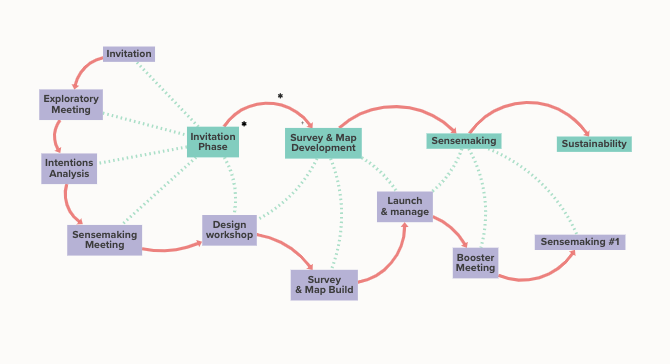
We’d
like to come out of it with some questions we can use to poll the
larger community that doesn’t attend, and to start to get a sense
of those that are interested in contributing their ideas or
contributing sweat in creating this map.
In any case, it will be an hour well-spent with you thinking about our community! We’re looking forward to it. If you have any questions feel free to contact Jim at best.jim@gmail.com.
Deborah Elizabeth Finn
Deborah Elizabeth Finn works with mission-based organizations as a network weaver, capacity builder, technical assistance provider, and nonprofit technology strategist. She holds degrees from Bennington College and Harvard University.
Deborah is a dedicated student of best practices in equity, inclusion, and positive social change, as well as a passionate proponent of collaboration, peer learning, communities of practice, knowledge sharing, leadership development, and mentoring. She founded the Mission-Based Massachusetts community in 2005, and the TNB Roundtable in 2013.
Deborah Fishman
Deborah Fishman is an entrepreneur, network-weaver, and founder of FED (www.fedsocial.co), an inclusive Jewish community and platform for ideas and art. Deborah works at the intersection of people, food and ideas, weaving together relationships that spark unexpected dialogue, synergy, and connection. Deborah views her mission in life as making sure everyone is fed — physically, intellectually, spiritually and on a basic human level. FED has hosted over 150 creative gatherings, in NYC, Paris, Jerusalem, Be'er Sheva, Mallorca, Budapest, Buenos Aires, San Francisco, and Boston. FED belongs to Hakhel: The Jewish Intentional Communities Incubator, for which Deborah serves as Advisor and Network Manager, and leads Hakhel's Arts & Culture Subnetwork. Deborah has 15 years' experience working in the Jewish community, including at The AVI CHAI Foundation and PresenTense, where she was the Editor & Publisher of PresenTense Magazine.

